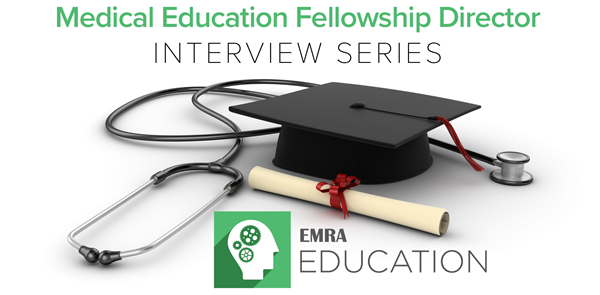The EMRA Education Committee is excited to bring you the Medical Education Fellowship Director Interview Series, which will allow Medical Education Fellowship Directors a platform to describe their fellowship program, highlight different medical education career paths, and provide resources for potential fellows.
If you are a MedEd Fellowship Director interested in submitting a profile on your program, please email EducationCtte@emra.org.
Medical Educatio Fellowship at University of California San Francisco – Zuckerberg San Francisco General
Director: Jillian Mongelluzzo, MD
Title: Assistant Professor of Emergency Medicine
Institution: University of California San Francisco – Zuckerberg San Francisco General
Tell us about you and your program.
UCSF-ZSFG offers a robust one-year fellowship, with an optional second year to pursue an advanced degree. Our fellows work clinically at UCSF’s emergency department, supervising UCSF-ZSFG emergency medicine residents, Highland emergency medicine residents, UCSF off-service rotating residents, as well as third- and fourth-year UCSF and visiting medical students.
Fellows participate in all education leadership meetings, residency and fellowship recruitment efforts, program evaluation, and curriculum design and implementation. Depending on their personal interests, fellows can spend more dedicated time within UME, GME, or CME program administration.
Fellows are funded to attend the ACEP Teaching Fellowship and also participate in the UCSF Health Professions Pathway, working with campus-wide experts in medical education. We emphasize diversity, equity, and inclusion in medical education, curriculum design and implementation, design thinking techniques, and technology in education.
An advanced degree is offered through a combined UCSF-UC Berkeley Master of Arts in Education. This provides the fellow with additional training with world-renowned experts in education, while still participating in DEM education initiatives.
How did you get involved in medical education, and what is your career path that led you to your Fellowship Director position?
I have had the fortune of having a somewhat winding career path. As chief resident at UCSF-ZSFG I became increasingly interested in medical education towards the end of my chief year. My first two years after residency I worked half-time in academics and half-time in community practice while pursuing multiple education scholarship projects and advancing my own knowledge of medical education. I ultimately joined the faculty full-time and shortly after became an Assistant Program Director for the UCSF-ZSFG emergency medicine residency. Ultimately, I chose to pursue a master’s degree in education at UC Berkeley and thereafter became the Medical Education Fellowship Director. This is my first year in this role, and I am passionate about developing a fellowship that trains humanistic, forward-thinking leaders in medical education.
What are the benefits to completing a fellowship in medical education?
As someone who did not do a fellowship, it has taken significantly more time for me to accomplish what our fellows are accomplishing within one year of residency graduation. You get structured, protected time to really develop your passion and ideas and launch a career.
Does your program have a particular niche within medical education or unique aspects potential fellows should be aware of?
We have access to the multitude of resources offered through UCSF, both campus-wide and within our department. Diversity, equity, and inclusion in education are very important to many educators in our department, and fellows can work alongside national leaders in this area. We have a diverse group of faculty and residents in which to work alongside and learn from as well. We have access to 3D printing and a makers lab, a simulation center, and are located in the tech hub of San Francisco.
What are the different career paths that fellowship graduates from your program have taken after graduation?
We have placed fellows both in academic education track positions as well as community emergency medicine positions with leadership roles in medical education at their clinical sites.
What advice do you have for residents who are just starting to get involved in medical education, especially residents who may not have a lot of resources at their own program?
You don't have to do everything before coming to fellowship. Your career is a journey of discovery. Take care of yourself first and foremost.
What qualities does your program look for in potential fellows?
We value diversity. We accept applicants from three- and four-year emergency medicine residency programs.
What is the application and interview process like at your program (ie, application requirements, timeline, match process, participation in CORD universal offer day)?
Application Requirements:
- CV
- Personal statement
- Letter of recommendation from Program Director
- One other letter of recommendation
- Interview (for the 2020-2021 application cycle we will be hosting Zoom interviews only)
Process:
Timeline TBD, based on CORD Common Offer Date
What are your thoughts on the value of a master’s degree in medical education? Does your program require it or accommodate fellows who want to pursue one?
An advanced degree is an optional component of our fellowship. Depending on the individual’s career goals, this can be extremely useful for some, but is not required of most people who specialize in medical education.
If a resident is interested in getting to know more about your program, what is the best way for them to get in touch with you?
Reach out! Email is still best (jillian.mongelluzzo@ucsf.edu). I, along with our current fellow, Tomás Diaz (tomas.diaz@ucsf.edu), and recent fellow, Rosny Daniel (rosny.daniel@ucsf.edu), are happy to chat about the program and what we can offer.



